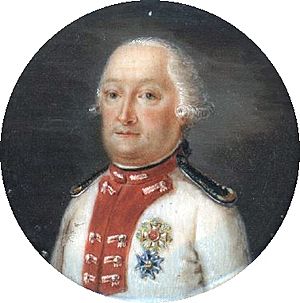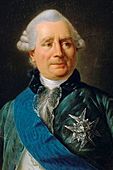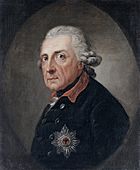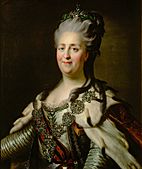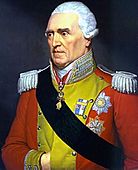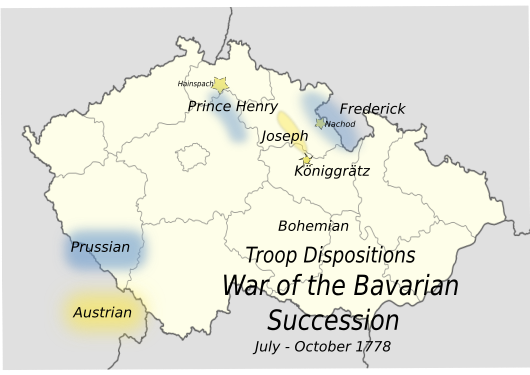War of the Bavarian Succession facts for kids
Quick facts for kids War of the Bavarian Succession |
|||||||||
|---|---|---|---|---|---|---|---|---|---|
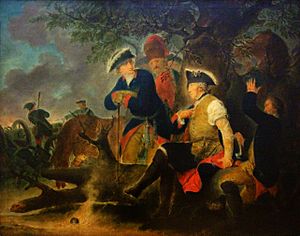 Friedrich der Grosse und der Feldscher, Bernhard Rode |
|||||||||
|
|||||||||
| Belligerents | |||||||||
| Commanders and leaders | |||||||||
| Strength | |||||||||
| 180,000–190,000 | 160,000 | ||||||||
| Casualties and losses | |||||||||
| ~10,000 killed, wounded, captured, missing, sick or dead from disease | ~10,000 killed, wounded, captured, missing, sick or dead from disease | ||||||||
The War of the Bavarian Succession was a fight between Austria and an alliance of Saxony and Prussia. It happened from July 1778 to May 1779. The main reason for the war was who would become the next ruler of Bavaria.
The ruling family of Bavaria, the House of Wittelsbach, had no direct heir. Austria wanted to take over Bavaria. But Saxony and Prussia wanted another branch of the Wittelsbach family to rule.
Both sides gathered huge armies. However, there were very few actual battles. Most soldiers died from sickness and not having enough food. This is why people called it the Kartoffelkrieg (Potato War) in Prussia and Saxony. In Austria, it was sometimes called the Zwetschgenrummel (Plum Fuss).
On December 30, 1777, Maximilian Joseph, the last Bavarian ruler from his family line, died. He had no children. Charles IV Theodore was the closest relative. But he also had no legal children to take his place. So, his cousin, Charles II August, Duke of Zweibrücken, was the next in line.
Meanwhile, Holy Roman Emperor Joseph II of Austria wanted Bavaria. He had even married Maximilian Joseph's sister years before to try and get a claim. Joseph made a secret deal with Charles Theodore to split Bavaria. But this deal ignored Charles August, who was the rightful heir.
Joseph wanted to expand Austria's power in German-speaking lands. Frederick the Great of Prussia saw Joseph's plan as a threat to Prussia's own power. Frederick's mother, Empress Maria Theresa, who ruled with Joseph, did not want a war. Frederick also did not want to fight. But Joseph insisted on his claim.
Frederick August III of Saxony wanted to protect Bavaria for his brother-in-law, Charles August. He also didn't want Austria to get more land. Even though Saxony and Prussia had been enemies before, Charles August asked Frederick for help. Frederick was happy to challenge Austria.
France also got involved. They wanted to keep the balance of power in Europe. Finally, Catherine the Great of Russia threatened to send 50,000 troops to help Prussia. This made Joseph change his mind. With Catherine's help, Joseph and Frederick signed the Treaty of Teschen on May 13, 1779. This treaty ended the war.
Some historians say this war was the last of the "old-style" wars. In these wars, armies moved slowly, and diplomats tried to solve problems. Later wars, like the French Revolutionary Wars, were much bigger and fought differently.
Contents
What Led to the War?
In 1713, Holy Roman Emperor Charles VI made a rule about who would inherit his lands. This rule, called the Pragmatic Sanction, said his daughters could inherit. This was unusual because usually only sons could inherit. Charles VI wanted to protect his family's lands.
Most European rulers agreed to this rule. But two important German states, Bavaria and Saxony, did not fully accept it. When Charles VI died in 1740, his daughter Maria Theresa had to fight for her right to rule.
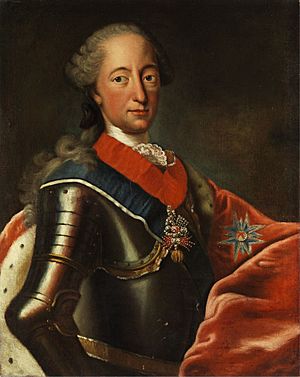
Charles, the Prince Elector of Bavaria, claimed the Austrian lands. He said his wife, who was the daughter of Charles VI's older brother, should inherit. Prussia, France, and Spain supported Charles of Bavaria. They went against the Pragmatic Sanction.
Charles of Bavaria needed military help. He got it through a treaty in 1741. During the War of the Austrian Succession, he captured Prague. He even tried to capture Vienna. But his French allies moved their troops to Bohemia. There, Frederick the Great had taken advantage of the chaos to take Silesia.
Charles of Bavaria's military plans failed. He then tried to become Holy Roman Emperor. He sold some land to Prussia for Frederick's vote. Charles became Emperor in 1742. But the next day, Austrian troops took over his capital, Munich. Maria Theresa's army then took over most of his lands.
Charles VII spent most of his three-year rule in Frankfurt. Maria Theresa fought Prussia for her lands. Frederick helped push the Austrians out of Bavaria. Charles VII died in 1745. His son, Maximilian III Joseph, inherited his father's titles but not his ambition to be emperor.
With the Peace of Füssen in 1745, Max Joseph agreed to vote for Maria Theresa's husband, Francis, to be emperor. He also accepted the Pragmatic Sanction. In return, he got his family's lands back. This brought peace to Bavaria for over 30 years, until Max Joseph's death in 1777.
Who Wanted What?
Max Joseph was the ruler of Bavaria, one of the biggest states in the Holy Roman Empire. He was also an Elector, meaning he helped choose the Holy Roman Emperor. When he died without children, many powerful men wanted parts of his lands.
The Heir
The next in line to rule Bavaria was Charles IV Theodore, who was 55 years old. He was already the ruler of another region called the Electoral Palatinate. According to old rules, he had to give up his Palatinate title to his heir before taking Bavaria. He didn't want to do this. He liked living in the Palatinate, which had a nice climate and a lively social scene. He loved the arts and had built many theaters and museums.
Charles Theodore had several children born outside of marriage. He wanted to gain more land, but he wanted land he could leave to these children in his will. Bavaria, however, had rules that meant it could only pass to a legal child.
The Deal-Maker
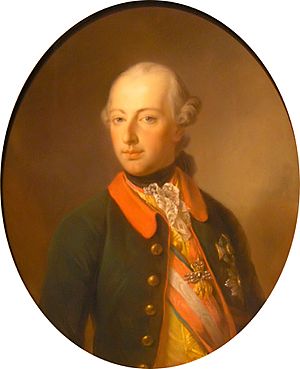
Joseph, the Archduke of Austria, really wanted Bavaria. He believed Austria needed more influence in the German-speaking parts of the Holy Roman Empire. He felt that without this, his family couldn't easily get their chosen emperor elected.
Joseph had married Max Joseph's sister in 1765, hoping to claim Bavaria. But she died without children. When Max Joseph died, Joseph had a weak legal claim to a part of Bavaria. Knowing his claim wasn't strong, Joseph made a secret deal with Charles Theodore. This deal, signed on January 3, 1778, said Charles Theodore would give a part of Bavaria to Austria. In return, Charles Theodore would get the rest of Bavaria without a fight.
Charles Theodore also hoped to get some other lands from Joseph that he could leave to his children born outside of marriage. But Joseph was not very generous. Also, this deal completely ignored the rights of Charles Theodore's true heir, Charles II August, Duke of Zweibrücken.
The Heir's Champion
Someone, perhaps Max Joseph's widow, secretly talked to Prussia. They wanted to protect the rights of Charles II August. Charles August was not a fan of Joseph. Joseph had prevented Charles August from marrying his sister years before.
Charles August had married Maria Amalia of Saxony in 1774. Her mother was Max Joseph's sister. Also, the Saxon ruler, Frederick August III, had married Charles August's sister. So, Charles August had strong family ties to Saxony. Both his mother-in-law and brother-in-law wanted him to get his rightful inheritance.
Diplomatic Tensions
Count Karl-Wilhelm Finck von Finckenstein, Frederick the Great's chief minister, believed that Austria gaining Bavaria would upset the balance of power. It would reduce Prussia's influence. Prussia had worked hard to become a strong power. To protect Prussia's status, Finck and Frederick formed an alliance with Saxony. They claimed to be defending the rights of Charles II August.
France had its own problems. It was helping the American colonies fight Britain. So, France wanted to avoid a war in Europe. Also, France had recently become allies with Austria, which was a big change from their past. Many French people still disliked Austria. The French foreign minister, Vergennes, also distrusted Austria. So, France managed to avoid having to send military help to Austria.
- The Main People Involved
-
Vergennes, France's foreign minister.
-
Frederick II (the Great).
-
Catherine II (the Great), Empress of Russia.
-
Frederick August of Saxony.
Tensions Grow
On January 3, 1778, Charles Theodore was announced as the new ruler of Bavaria. Austrian troops then occupied a part of Bavaria. Charles Theodore realized that Joseph was not going to give him much in return.
While Charles Theodore's dreams faded, Joseph continued to take parts of Bavaria. Charles August's supporters asked Prussia for help. Frederick's envoys convinced Charles August to protest to the German parliament. Joseph's troops stayed in Bavaria, even setting up their own government in one town. This caused a diplomatic crisis.
Prussian troops moved near the border with Bohemia. This reminded everyone of Frederick's invasion in 1740. France told Joseph they would not help him fight Prussia. Britain, Prussia's ally, was busy with the war in America. But Prussia's army was strong. Saxony, allied with Charles August, was ready to send 20,000 troops. Russia's Catherine II did not want a costly European war.
For four months, leaders traveled between cities to negotiate. By spring 1778, Austria and Prussia had huge armies facing each other. It looked like another big European war was about to start.
The "Potato War" Begins
When it was clear that other rulers would not accept Austria taking Bavaria, Joseph and his minister gathered troops. They had 180,000–190,000 Austrian soldiers and 600 cannons in Bohemia and Silesia. This was most of Austria's army.
On April 6, 1778, Frederick of Prussia set up his army of 80,000 men near the Bohemian border. His younger brother, Prince Henry, led a second army of 75,000 to 100,000 men in Saxony. By April, the armies were in place, and talks stopped.
In early July 1778, a Prussian general named Johann Jakob von Wunsch crossed into Bohemia with a few hundred men. A small Austrian cavalry unit, led by Captain Friedrich Joseph, Count of Nauendorf, met them. Nauendorf's small group surprised the Prussians and made them retreat. Nauendorf was promoted for his bravery. This small fight showed what the war would be like.
The Invasion and Standoff
A few days later, Frederick entered Bohemia. His 80,000 troops took one town but went no further. The Austrian army was on high ground along the Elbe river. Joseph was in charge, but Count Franz Moritz von Lacy was the real commander. Lacy had set up a strong defense with three lines of forts and 600 cannons.
Another Austrian army, led by Baron Ernst Gideon von Laudon, guarded the passes from Saxony into Bohemia. Prince Henry of Prussia moved around Laudon's troops and entered Bohemia. Laudon had to pull back. By mid-August, the main Austrian army was in danger of being surrounded.
While the main Austrian army stayed in its strong position, Joseph encouraged small attacks on Prussian troops. On August 7, 1778, Major Nauendorf led a raid on a Prussian supply convoy. He captured officers, men, horses, and wagons of food. This type of action was common throughout the war. There were no big battles. The armies mostly tried to cut off each other's supplies. Soldiers often said they spent more time looking for food than fighting.
The armies stayed in their camps for months. They ate all the food and animal feed for miles around. Prince Henry told his brother Frederick that they would run out of supplies soon. Frederick agreed. He thought about attacking the Austrians from behind. But he realized Joseph's defenses were too strong. An attack would cost too many Prussian lives. Frederick worried about other countries like Russia and Sweden taking advantage of a weakened Prussia.
So, the armies stayed put until September, eating up the countryside. The Austrians often fired cannons at the Prussian army below them. Frederick himself was almost hit by a cannonball.
Nauendorf continued his raids. Soldiers dug up local potato crops. Joseph and Frederick just watched each other. Empress Maria Theresa secretly sent her minister to Berlin to offer a truce. She even wrote to Catherine of Russia for help. When Joseph found out, he was furious and offered to quit.
Catherine offered to help make peace. She also said she would send 50,000 troops to help Prussia if needed. Frederick began to pull back some of his troops in mid-September. In October, Joseph also pulled most of his army back. Small groups of cavalry stayed behind to watch each other while diplomats talked.
Winter Fights
During the winter, Austrian commander Dagobert Sigmund von Wurmser ordered an attack on a Prussian village. His troops killed or captured 800 Prussians and took their flags. Joseph gave Wurmser an award for this success.
On January 1, 1779, another Austrian force attacked a Prussian village in Silesia. They defeated a larger Prussian force, losing only 20 men while the Prussians lost 800. Two weeks later, Wurmser led five columns into the County of Glatz. They captured a town and many Prussian soldiers. Wurmser's troops destroyed two villages.
On March 3, 1779, Nauendorf again raided a Prussian camp and captured the entire garrison. Joseph gave him another award.
What Happened Next?
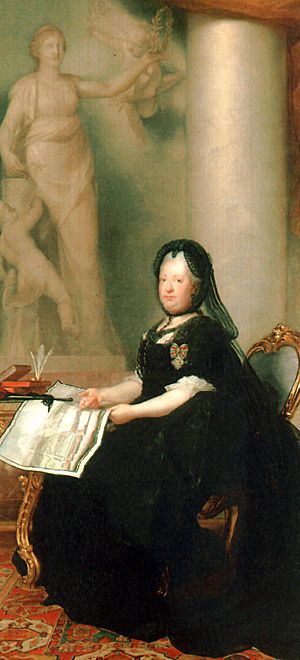
In the Treaty of Teschen (May 1779), Maria Theresa gave most of Bavaria back to Charles Theodore. But Austria kept a small strip of land called the Innviertel. This small area had 120,000 people. Saxony received six million gulden (money) for its help.
The War of the Bavarian Succession was the last war for both Frederick the Great and Maria Theresa. They had started and ended their reigns fighting each other. Even though they had huge armies, neither leader used all their military power.
Many soldiers died from starvation and disease. Some estimates say tens of thousands died. Historian Thomas Carlyle estimated about 10,000 Prussian and 10,000 Austrian deaths. Other historians suggest around 30,000 combined deaths. The main causes were diseases like cholera and dysentery.
The war was expensive. Prussia spent 33 million florins. Austria spent even more, 65 million florins. Joseph himself called war "a horrible thing... the ruin of many innocent people."
Changes in Warfare
This war was seen as the last of the "old style" European wars. In these wars, armies moved slowly, and diplomats tried to solve problems. Even though it was short, it cost many lives and a lot of money.
However, some things in this war hinted at future conflicts. The huge size of the armies showed that countries could now gather and train many more soldiers. Military spending also increased greatly, especially for Austria.
The Austrians called the war Zwetschgenrummel ("Plum Fuss"). The Prussians and Saxons called it Kartoffelkrieg ("Potato War"). Some historians think it got this name because soldiers ate a lot of potatoes. Others say it was because the war happened during the potato harvest.
The Problem Returns
The main problem was not fully solved. Joseph still wanted to expand Austria's power in German-speaking lands. He believed this was the only way to counter Prussia's growing strength.
In 1785, Joseph again tried to make a deal with Charles Theodore. He offered to trade parts of Bavaria for parts of the Austrian Netherlands. The Netherlands lands were rich but caused Joseph many problems. Charles II August again protested. Frederick of Prussia again offered help.
This time, there was no war. Instead, Frederick formed the Fürstenbund (Union of Princes). This group of powerful German princes pressured Joseph to give up his plans. Joseph's actions actually made Prussia seem like a protector against Austrian ambition. In 1799, Bavaria passed to Maximilian IV Joseph, Charles August's brother.
Long-Term Effects: German Rivalry
Joseph understood that Austria needed more German-speaking lands to be powerful in the Holy Roman Empire. Most of Austria's power came from its lands in Eastern Europe, Italy, and the Lowlands. Joseph wanted to shift Austria's focus to German-speaking Central Europe. This meant getting Bavaria and getting back Silesia, which Prussia had taken.
By the late 1770s, Joseph faced challenges. Britain, once Austria's ally, was now allied with Prussia. France was an ally but unreliable. Russia was looking to expand its own power. Frederick of Prussia was still Austria's main enemy.
The map of Europe changed quickly in the late 1700s. Rulers wanted more control over their lands and clear borders. For Joseph, getting Bavaria would connect Austrian lands in Bohemia with those in the Tyrol. It would also make up for losing Silesia. Bavaria offered a chance to strengthen Austria's power, get more money, and gain more German-speaking soldiers.
Frederick, however, wanted to keep things as they were. He had fought enough wars. He saw diplomacy as another way to compete with Austria. The rivalry between Austria and Prussia, known as German dualism, continued for many years. It played a big role in the later unification of Germany.
See also
 In Spanish: Guerra de sucesión bávara para niños
In Spanish: Guerra de sucesión bávara para niños
 | John T. Biggers |
 | Thomas Blackshear |
 | Mark Bradford |
 | Beverly Buchanan |


